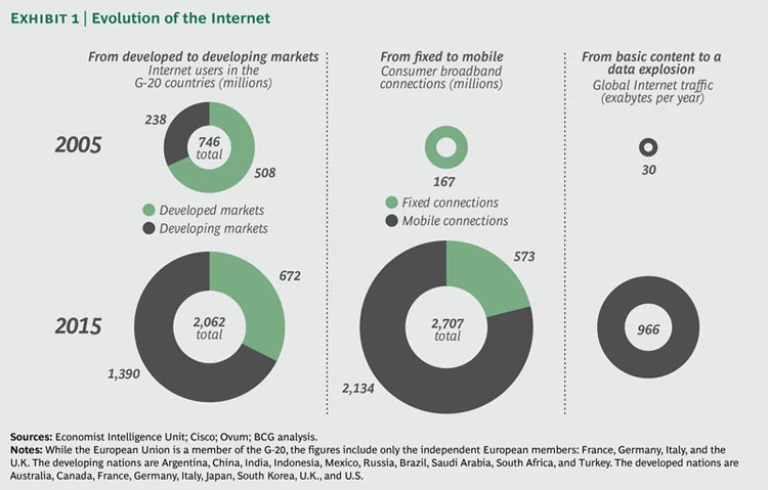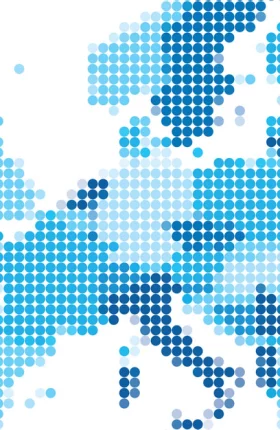The January 2012 report in our Connected World series examined how companies and countries can win in the digital economy. This follow-up report provides a more comprehensive analysis of how the scale and speed of Internet-driven economic growth is changing countries, cultures, and companies around the world. It includes national snapshots capturing the economic impact of the Internet as well as in-depth looks into consumer and business usage in the
Since the day the first domain was registered in 1985, the Internet has not stopped growing. It has sailed through multiple recessions and one near-collapse and kept on increasing in use, size, reach, and impact. It has ingrained itself in daily life to the extent that most of us no longer think of it as anything new or special. The Internet has become, quite simply, indispensible.
By 2016, there will be 3 billion Internet users globally—almost half the world’s population. The Internet economy will reach $4.2 trillion in the G-20 economies. If it were a national economy, the Internet economy would rank in the world’s top five, behind only the U.S., China, Japan, and India, and ahead of Germany. Across the G-20, it already amounted to 4.1 percent of GDP, or $2.3 trillion, in 2010—surpassing the economies of Italy and Brazil. The Internet is contributing up to 8 percent of GDP in some economies, powering growth, and creating jobs.
The scale and pace of change is still accelerating, and the nature of the Internet—who uses it, how, and for what—is changing rapidly too. Developing G-20 countries already have 800 million Internet users, more than all the developed G-20 countries combined. Social networks reach about 80 percent of users in developed and developing economies alike. Mobile devices—smartphones and tablets—will account for four out of five broadband connections by 2016.
The speed of these developments is often overlooked. Technology has long been characterized by exponential growth—in processing speed, bandwidth, and data storage, among other things—going back to Gordon Moore’s observation nearly five decades ago. The Intel 80386 microprocessor, introduced in the same year as that first domain name, held 275,000 transistors. Today, Intel’s Core i7 Sandy Bridge-E processor holds 2.27 billion transistors, or nearly 213 times as many. As the growth motors along, it is easy to lose track of just how large the exponential numbers get.
The power of exponential growth is illustrated by an ancient fable, repopularized by Ray Kurzweil in his book, The Age of Spiritual Machines . It tells of a rich ruler who agrees to reward an enterprising subject starting with one grain of rice on the first square of a chessboard, then doubling the number of grains on each of the succeeding 63 squares. The ruler thinks he’s getting off easy, and by the thirty-second square, he owes a mound weighing 100,000 kilograms, a large but manageable amount. It’s in the second half of the chessboard that the real fun starts. Quickly, 100,000 becomes 400,000, then 1.6 million, and keeps growing. By the sixty-fourth square, the ruler owes his subject 461 billion metric tons, more than 4 billion times as much as on the first half of the chessboard, and about 1,000 times global rice production in 2010.
The Internet has moved into the second half of the chessboard. (See Exhibit 1.) It has reached a scale and level of impact that no business, industry, or government can ignore. And like any technological phenomenon with its scale and speed, it presents myriad opportunities, which consumers have been quick and enthusiastic to grasp. Businesses, particularly small and medium enterprises (SMEs)—the growth engine of most economies—have been uneven in their uptake, but they are moving online in increasing numbers and with an increasingly intense commitment.
There are threats too, some misunderstood, and policymakers and regulators alike are challenged to make the right choices in a fast-moving environment. As is often the case with fast-paced change and complex issues, many governments are still trying to determine what their role should be.
Meanwhile the rice pile on the next square keeps getting bigger.
This report assesses the far-reaching economic impact of the Internet. It shows how the benefits are large and getting larger, identifies the drivers behind them, and examines their clout. It quantifies gains—economic growth, consumer value, and jobs—in the context of the economies of the G-20. It demonstrates that no one—individual, business, or government—can afford to ignore the ability of the Internet to deliver more value and wealth to more consumers and citizens more broadly than any economic development since the Industrial Revolution.










